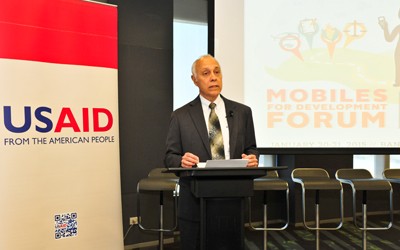
Good morning all, and welcome to USAID’s second Mobile Solutions for Development Forum. USAID’s Regional Development Mission for Asia (RDMA), along with our partner and event co-organizer, FHI360, is privileged to have close to 100 people here today, all with amazing backgrounds and experience - from the private sector, NGOs, and the academic community, to other donors, USAID staff, and implementing partners, from many countries in the region. I am sure your discussions will be rich and productive!
This year’s forum brings people together to share insights about using mobile technology to address the region’s most important development challenges, and we all recognize that we will do a better job delivering stronger results if we take full advantage of mobile solutions in the work we do. For example, just here in RDMA, each of our four technical teams has supported development of mobile apps for greater impact, ranging from marine fisheries management in the Solomon Islands and small-scale aquaculture extension services in Indonesia, to illegal wildlife trafficking. Working with university students in Thailand, Microsoft, and other partners, we’ve supported apps ranging from improved national park management and support for people living with HIV/AIDs, to real-time flood mapping using crowd-sourced data. And that’s just RDMA – I’m sure we will learn of many remarkable examples of mobile solutions from you all over the next couple of days.
And the opportunities today, with such increased penetration of mobiles, are extraordinary! In 1990, some years after I joined USAID, there were 1 million mobile phones in use; today, there are apparently about 5 billion. More people use mobiles than toothbrushes, and even more amazing, each of us with a mobile has demonstrably more power to help drive development – literally, in the palms of our hands.
We are delighted to have you all here, and to provide an opportunity for increased dialogue between the technology, and the development, communities - and that’s basic to addressing many of the world’s most challenging problems. Your participation in this Forum will help us to better reach our development objectives in Asia, and we thank you for your engagement.
I’d like to offer a special welcome and congratulations to our six Contest finalists and grand prize winners for Mobile Solutions for Development, and for Mobile Financial Services, highlighting innovative approaches to health, agriculture and economic growth. We’re seeing many examples of how mobile technology changes how people interact with one another, and with their communities, governments, and the world. Mobiles are of course also transforming the way business is done, and services delivered.
Since last year’s first Mobile Solutions for Development in Asia forum, we’ve continued to increase integration of science and technology into USAID’s regional portfolio, including by using mobile and other technologies to accelerate development progress; supporting research to fill knowledge gaps; and strengthening capacities for evidence-based decision-making.
For example, through our Connecting the Mekong through Education and Training program, USAID is working with technology giants like Google and Cisco, with other major partnerships in the works, to deliver training using mobile devices to thousands of young people in Asia. This will help close the gap in STEM learning skills between the lesser and more developed nations in Asia, and expand opportunities for growth. Ultimately, it will also help to strengthen ASEAN integration, a major regional priority.
I hope this event will help catalyze stronger partnerships between USAID and the technology community. More important, I hope it will help lead to the more effective use of mobile technology for development, to support what our USAID Administrator calls our “relentless focus on results.” In the end that’s what we are all here for, to deliver stronger results to improve peoples’ lives, and mobile technologies can indeed be transformational.
I wish you all a productive and engaging Forum, and thank you for your active participation!







Comment
Make a general inquiry or suggest an improvement.